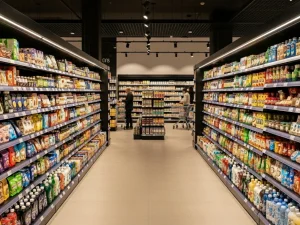If you’re managing multiple store locations, you know that store visits are still one of the most effective ways to spot problems and maintain high standards. But without a checklist, these visits often turn into casual walkthroughs with no follow-up.
Read: The Complete Guide to Retail Operations
This guide gives you a clear structure for every retail store visit – plus a downloadable checklist you can start using today.
What to Include In A Retail Store Visit Checklist
Here’s what every retail store visit checklist should cover, plus specific tasks under each area.
Store cleanliness & hygiene
First impressions count, and in retail, they often happen before a customer even walks through the door. Clean windows, tidy floors, and well-maintained entrances signal professionalism, attention to detail, and respect for the customer experience.
Inside the store, cleanliness affects everything from how long customers stay to whether they return. A clutter-free, hygienic space not only supports health and safety standards but also makes products more appealing and the overall shopping experience more enjoyable.
This is the foundation, if it’s not right, nothing else will be.
Tasks to check:
Entryway and windows are clean and free of clutter
Floors are clean and dry
Shelves and product displays are dust-free
Fitting rooms and restrooms are tidy (if applicable)
Trash bins are emptied and odor-free
Hand sanitizer stations are full and accessible

Staff presentation & customer service
Your people are your brand. They’re the face of every interaction, and their appearance, attitude, and knowledge directly shape how customers perceive your store. A well-presented, engaged team creates trust and leaves a lasting impression, while a disinterested or poorly presented staff member can undo the impact of even the best merchandising or promotions.
During store visits, it’s essential to assess not just if staff look the part, but whether they’re delivering the level of service your brand promises. From greetings to problem-solving, great service is what turns one-time shoppers into loyal customers.
Tasks to check:
Staff are wearing uniforms or dress code
Name tags (if used) are visible and correctly placed
Greeting and engagement with customers is proactive
Enough staff present for the time of day
Staff behavior is professional and aligned with company values

Visual merchandising & signage
Are you telling the right story in-store?
Visual merchandising is all about guiding the customer journey, highlighting key products, and reinforcing your brand identity. Signage and displays should be clear, on-brand, and aligned with current campaigns or seasonal themes.
When done right, merchandising draws attention to high-margin items, simplifies navigation, and subtly influences purchasing decisions. A store visit is the perfect time to check if the visual story is consistent, compelling, and being executed as planned across all locations.
Tasks to check:
Window displays are current and aligned with seasonal campaigns
Promotional signage is visible, up to date, and correctly placed
Product grouping and shelf layouts match planograms
Featured products are fully stocked and clearly highlighted
In-store navigation signage is clear and consistent
Brand guidelines are followed for visuals, fonts, and placements
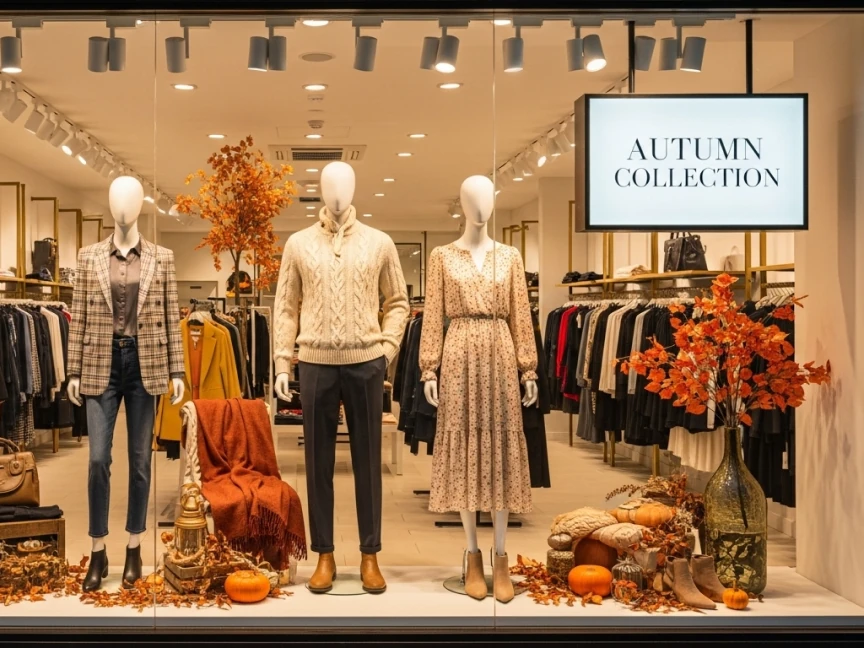
Stock levels & inventory display
A product can’t sell if it’s not on the shelf, and if it’s hard to find or poorly displayed, the result is the same. Inventory accuracy and product availability directly impact both revenue and customer satisfaction.
During store visits, it’s important to assess not just whether shelves are stocked, but how they’re stocked. Are bestsellers front and center? Are shelves tidy and well-faced? Are price tags accurate? The goal is to make purchasing easy and intuitive, while ensuring the store doesn’t lose sales to out-of-stocks or disorganized displays.
Tasks to check:
No major out-of-stock issues on key products
High-demand items are front-faced and easy to find
Overstock or backroom clutter is under control
Price labels match system pricing
Inventory dates (e.g., perishables) are within range
Replenishment schedules are followed
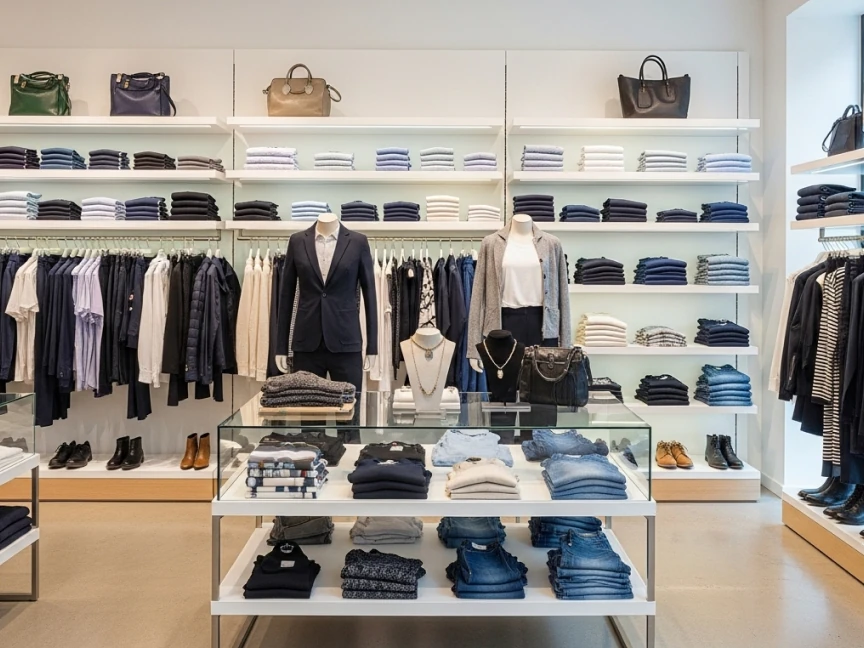
Safety and maintenance
Safety issues cost time, money, and trust, and they’re often the easiest to overlook during a busy day. From blocked emergency exits to loose wires or broken fixtures, small problems can quickly turn into serious risks for both customers and staff.
Maintenance issues also affect how your store is perceived: flickering lights, dirty vents, or broken equipment send the message that standards are slipping. Store visits should always include a check for safety hazards and wear-and-tear, so problems are caught early and resolved before they escalate.
Tasks to check:
Fire exits and emergency paths are clear
Electrical cords are secured and not exposed
Fixtures and shelving are stable and undamaged
Air conditioning, lighting, and equipment are functional
Any spills or hazards are marked and being handled
Security cameras and alarms (if present) are operational
Follow-up tasks and issue tracking
A visit is only useful if it’s followed by action. Spotting issues is just the first step; what really drives improvement is making sure they’re resolved quickly and consistently. That means assigning clear tasks, setting deadlines, and following up. Without a system in place, feedback gets lost, accountability drops, and the same problems show up again and again.
During each store visit, it’s essential to track what’s been done since the last check-in, what still needs attention, and who’s responsible for next steps. This is where lasting impact comes from, turning observations into measurable progress.
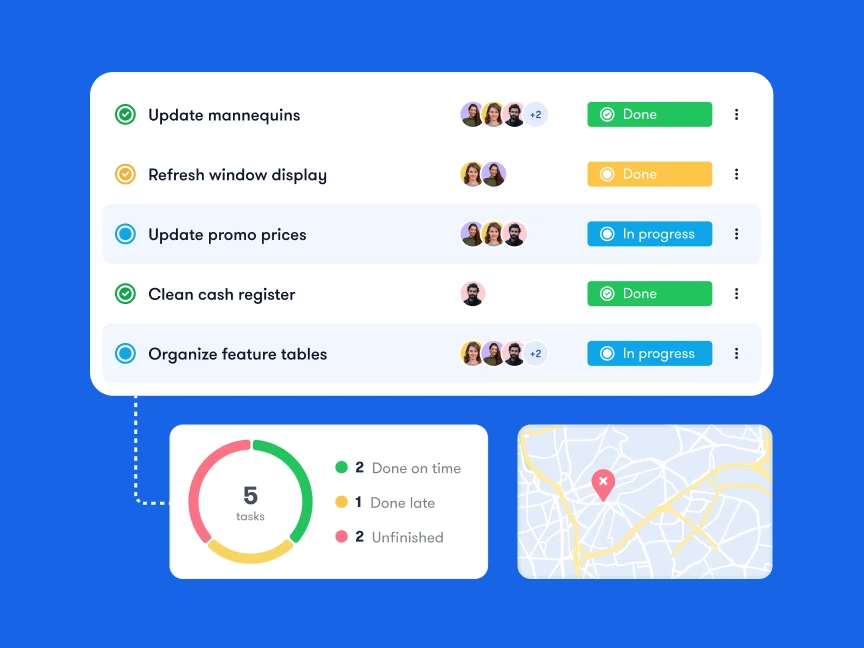
Tasks to check:
Any issues are logged in a central system (not just notes)
Tasks are assigned to specific people with deadlines
Urgent issues flagged for immediate attention
Notes or feedback are documented and shared with the team
Next visit date is scheduled if required
Performance trends (vs. last visit) are discussed
Download the Free Retail Store Checklist
Why Digital Checklists Work Better
Paper checklists get lost. WhatsApp threads go unanswered. And Excel files buried in email chains don’t help anyone move faster. A digital checklist gives your team the structure and speed they need to stay on top of store operations, without the back-and-forth.
With a digital system, checklists are consistent across all locations, updates are shared in real-time, and follow-up tasks can be assigned immediately. You can attach photos, flag urgent issues, and track completion rates, all in one place. More importantly, everything is documented, so nothing slips through the cracks.
With tools like Bitreport, you can:
Run audits in real-time on mobile
Assign corrective tasks instantly
Track compliance over time
Collect photo evidence in one place
Get dashboards that show what’s getting done, and what’s slipping
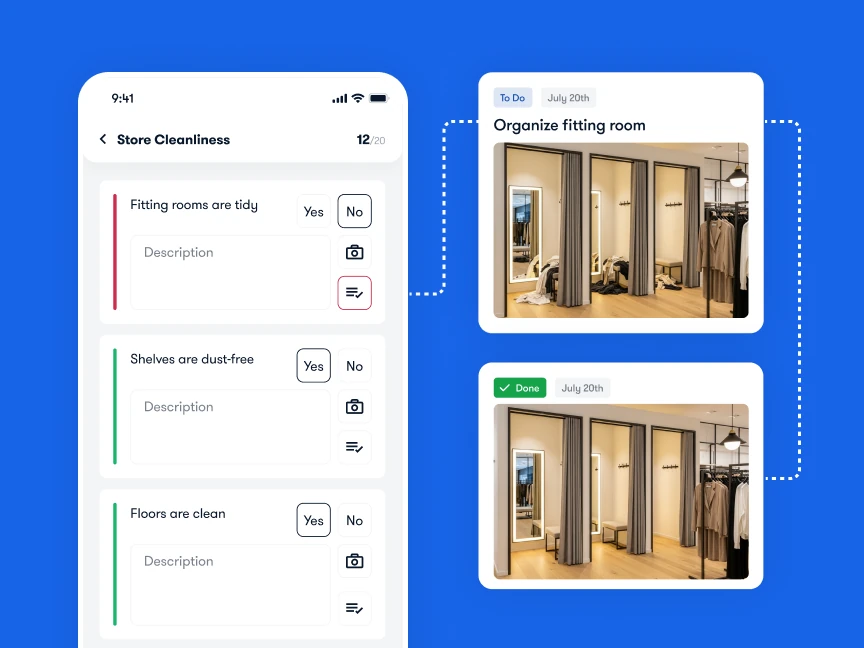
Want to Take It a Step Further?
If you’re managing multiple stores, Bitreport helps you digitize your store visit process—saving time, improving execution, and giving you real visibility into what’s happening on the ground.
90% faster audits
60% fewer missed tasks
2x faster issue resolution





